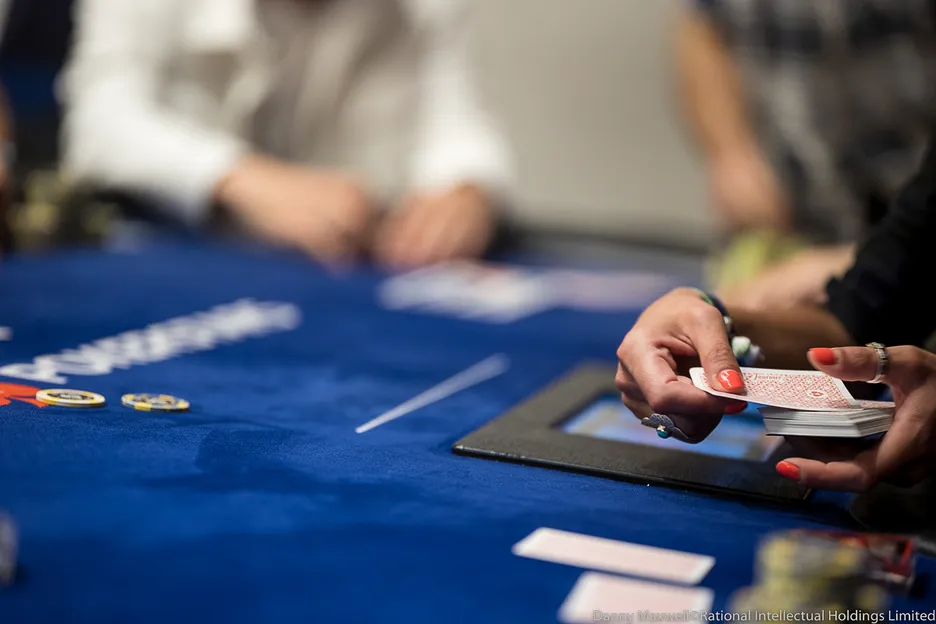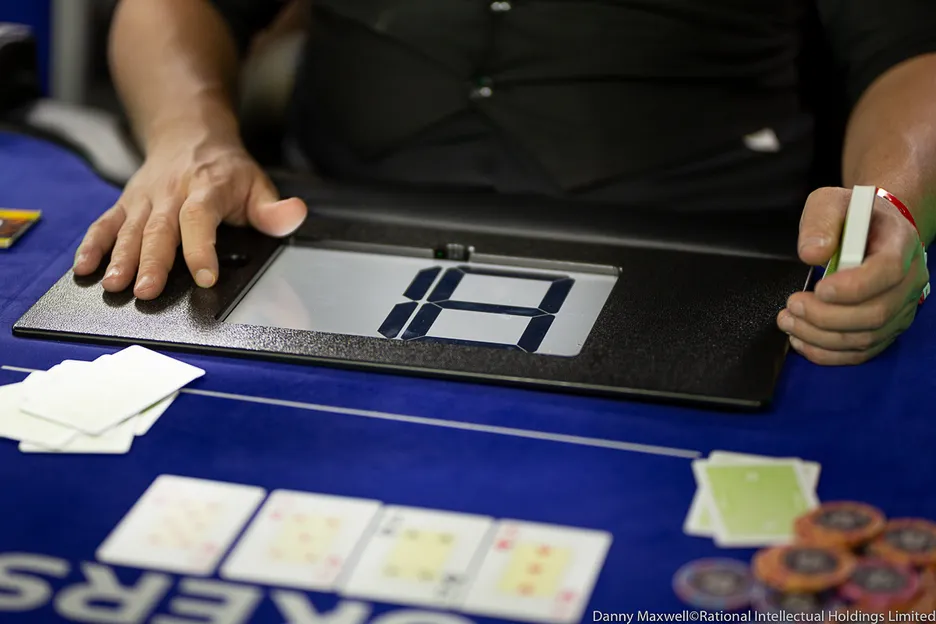This week's European Poker Tour Barcelona stop debuts a set of rule changes for the PokerStars tour with safeguards and adjustments meant to address issues like stalling, solvers, and cameras at the table.
Last week's announcement from PokerStars Ambassador Kenny Hallaert came after a summer that saw the solver controversy take center stage at the WSOP Main Event. Other problems, like stalling, have been percolating for some time, while new technology has forced a dramatic change in the way that PokerStars will train its dealers.
Toby Stone, the Tournament Director for the EPT, presides over a tour that strives for a high-caliber player experience that draws a lot of its quality from its efficiency. He sat down with PokerOrg in Barcelona — where the EPT is celebrating its 20th anniversary — to share some insight into the thought process behind the new rules.
"There's been a number of changes due to a few different reasons. One of the major ones is slide-dealing instead of pitching. Obviously, there are a lot of scandals going around, a lot of talk about cheating with cameras and capturing the cards as they're pitched with that information going somewhere."
Stone thinks there may be some exaggeration of the problem — "But it definitely is happening," he says. "And just from a technology perspective, it's relatively simple for a camera to be catching cards and that information going to the player's ear."
Slide dealing 'should stop it'
Any extra information is a big advantage for players and poker has been fighting technology for some time. Stone says that previous attempts to ban phones at the table and on the rail have failed.
"It just put the dealers in front of the players arguing. Dealers hated the players, the players hated us, and we just failed. So, in the end, it wouldn't even fix the problem because you could have a camera on a ring or you could have it in a piece of clothing."
The potential for undetected cameras to capture cards is a problem for tournament organizers, but a problem that Stone says can be cured by slide-dealing — a method where the dealer pushes the cards onto the felt before sliding it across the table to the player.
"It's how I learned to deal many years ago. Some of our dealers can already slide-deal, but it's not that many."
It's a training challenge for PokerStars, but Stone is committed to a complete transition within a year.
"Obviously, we have some great dealers so we're going to give them the opportunity to learn. We're going to give them the stuff that they need and send them some people who know how to do it to help them train."
Stone expects all dealers to be able to slide-deal by EPT Monte Carlo in 2025. "There are other ways to cheat, of course, like card marking, and who knows what's coming in the future, right? But in terms of that particular way of cheating, that really should just stop it."
Solvers banned from tournament area
PokerStars has also taken a hard stance on solvers by banning them from the tournament area, with a prohibition on use by spectators, as well.
"Our general policy in PokerStars is that you shouldn't be getting any real-time help. Well, what does real-time help mean? Real-time help means when you're playing poker. That means when the clock's running. That's what it means to us."
As far as breaks? Go nuts, Stone says.
"On a break, you knock yourself out. Do what you want on a break. We don't care. You're not playing on a break. When that clock's running, we consider you playing and therefore we are gonna stop you from using solvers or any type of software while you're playing."
Enforcement is another story. It's much more difficult to police solvers with 100 tables in a tournament, and Stone says they don't want to spend time looking over everyone's shoulders.
"We've got cameras, but we can't be zooming in on people's phones to check that they're not using solvers. Essentially, it is not an easy thing to enforce. However, we have many rules that are not easy to enforce. It's not the only one. We have others. So, it's definitely a deterrent."
Stone thinks that players, for the most part, will respect the rule and follow it. "We're going to have some people who are going to ask us some difficult questions. 'What are you going to do if you catch me?' 'What if I tell you he's using a solver?' We're going to have all these kinds of people, we already know who they are."
The important stages of the tournament are easier to enforce, he says, because there are fewer people in the tournament and more eyes on them. It stands out if someone is running over to the rail to look at an electronic device. "You shouldn't be jumping up, running away from your seat, checking something out and running back to your seat. We're not gonna allow that to happen. It's a mind sport."
The stalling problem
Other adjustments for EPT Barcelona, like the elimination of the late-tournament redraws and the reduction of the pre-flop shot clock, are meant to address stalling, something Stone says "has become a problem." Redraws will now be replaced by a random breaking order for the final five tables.
The shot clock adjustment takes the pre-flop limit from 30 to 15 seconds. It's an attempt to deal with problems surrounding the abuse of time and time banks — a contentious issue.
"Some people think it's a legitimate strategy to use them to ladder up. Some people think it's a legitimate strategy to make sure that person pays a bigger blind. I personally don't think that."
It's a difficult thing to enforce, so Stone may be flipped to the other side over time. "Right now we have a policy that if we feel you're wasting time, then we'll just take those time bank cards off you. Now, how do you know if someone's wasting time? It's very, very difficult. So even though I might think I disagree with that strategy, to a point there's not that much I can do about it."
He says that doesn't mean they have to sit back and allow it.
"I think we still should have some kind of idea that it's not a moral strategy, right? And again, the field is split here. I was at the TDA recently and half of them said, ‘It's their time, let them do what they want with it.’ And I'm like, no, at least let's try to not push out that idea into the poker world. Can we do anything about it? Probably not, but we're not okay with it. We don't want you to do it."
More shot clocks in the future?
Stone says the EPT is considering the addition of shot clocks in more tournaments, especially late-night hyper turbos and similar structures that might benefit from it. But, overall, he says he's not keen on the idea.
"We qualify a lot of people, especially in the low-blind tournaments. We get more recreational players and I personally don't want to put them under that kind of pressure. I think it really favors the pros and I think anything you do that favors the pros in the long term is probably not very good for poker."
Stone isn't against ceding ground on the issue. You have to pick your battles as a poker tournament organizer. "I might be dragged along kicking and screaming. And in a year or two, we might see every tournament with a shot clock. Personally, I'm resisting that a little bit. But there's other people who are not resisting it. So maybe I have to move along with the times. Kicking and screaming."
Photos courtesy of Eloy Cabacas/Danny Maxwell/PokerStars/Rational Intellectual Holdings Ltd.





